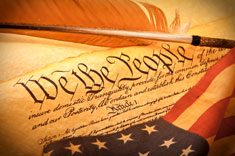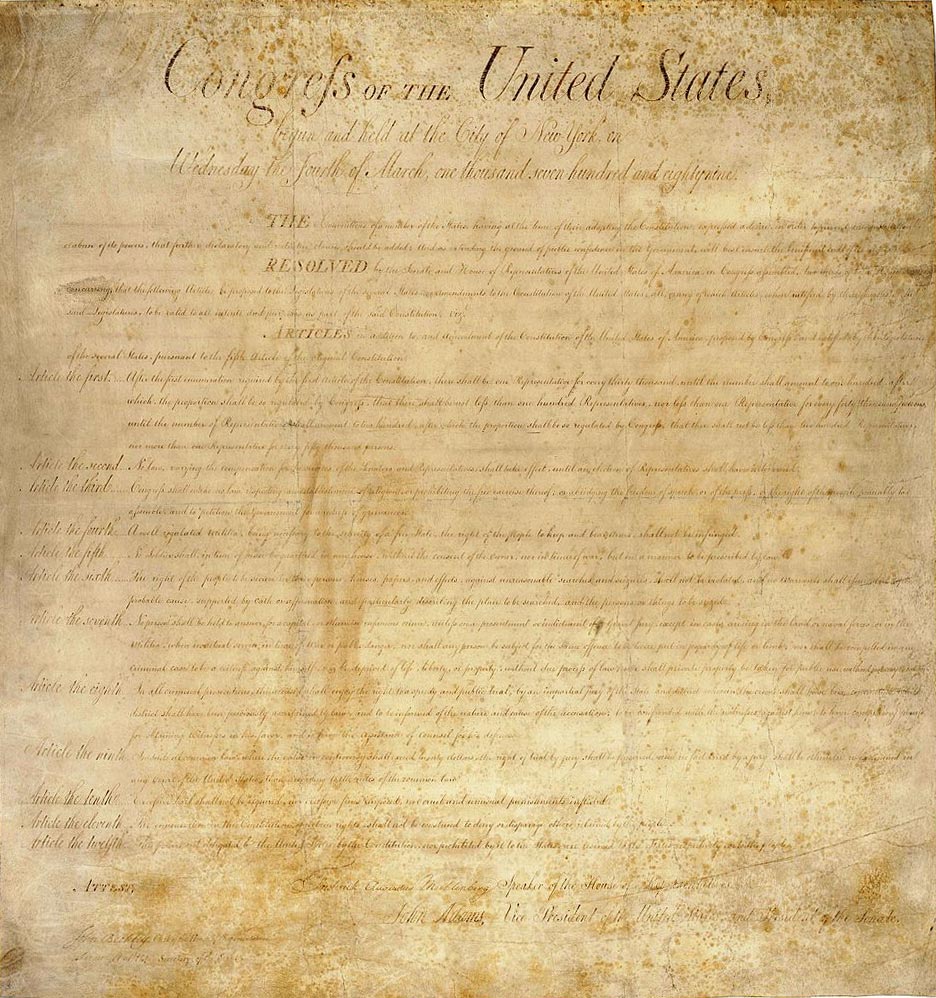| United States Constitution | |
|---|---|
 |
|
| The U.S. Constitution | |
| Preamble | |
| Articles of the Constitution | |
| I ‣ II ‣ III ‣ IV ‣ V ‣ VI ‣ VII | |
| Amendments to the Constitution | |
| Bill of Rights | |
| I ‣ II ‣ III ‣ IV ‣ V ‣ VI ‣ VII ‣ VIII ‣ IX ‣ X | |
| Additional Amendments | |
| XI ‣ XII ‣ XIII ‣ XIV ‣ XV ‣ XVI ‣ XVII ‣ XVIII ‣ XIX ‣ XX ‣ XXI ‣ XXII ‣ XXIII ‣ XXIV ‣ XXV ‣ XXVI ‣ XXVII | |
| View the Full Text | |
| Original Constitution | |
| Bill of Rights | |
| Additional Amendments |
The basic rights described and provided for by the 1st Amendment of the U.S. Constitution are at the very heart of what it means to be an American citizen. It defines what the United States is all about. These rights are so fundamental, they are even taken for granted at times — but without them, it could essentially be said that America would not be America, and the United States would not be a free nation.
Text
Congress shall make no law respecting an establishment of religion, or prohibiting the free exercise thereof; or abridging the freedom of speech, or of the press; or the right of the people peaceably to assemble, and to petition the Government for a redress of grievances.
Freedom of Speech
It is the 1st Amendment that grants us that most hallowed right — the freedom of speech. It would be difficult to imagine a free society without this basic right. It means that people and the media are allowed to express their own without fear of criticism from the government or fear of prosecution or suppression by the state.
 In many countries around the world, people can — and are — sent to prison, tortured or even executed, for expressing opinions not shared by the government. In the United States, any government official, no matter how powerful, must abide by the opinions of the people, even when those opinions are scathing, stinging and brutal, or even unfair.
In many countries around the world, people can — and are — sent to prison, tortured or even executed, for expressing opinions not shared by the government. In the United States, any government official, no matter how powerful, must abide by the opinions of the people, even when those opinions are scathing, stinging and brutal, or even unfair.
Freedom of Press
The 1st Amendment extends the liberty of free speech to the media by citing “freedom of the press” as a fundamental right of American citizens.
The Founding Fathers were careful to include press freedom because they realized that a government which controls the media can easily become an oppressive government. When you control the messages in the media, you effectively control the minds of the populace.
Thomas Jefferson was especially aware of the dangers of a press that was controlled or censored by the government. On his extensive travels throughout Europe, Jefferson noted that those nations which were most restrictive of freedoms and individual rights allowed only state-run or government-sanctioned newspapers to publish. Benjamin Franklin was also an ardent supporter of press freedom — both in theory, and because he was in the newspaper and printing business himself.
Exceptions to Free Speech
The U.S. probably has the most unfettered policy in the world on free speech and free press, but even this has some limits. Many people think there are no exceptions to what you can say and cannot say legally, but there are actually several. For example, you cannot publish child pornography. You can also not threaten to kill the President of the United States. That’s a federal crime and not free speech. You also cannot endanger others — such as when “yelling fire in a crowded movie theater” — when there is no fire.
You also can be charged with a crime if you commit libel or slander – that is, say or publish information that is wrong, damaging or untrue about another person or company. Even so, the bar is very high for prosecution of libel and slander. It must be proved in a court of law that not only that what was said is untrue, but that there must also be “premeditated malicious intent” behind the statement.
Thus, a newspaper or TV news show may report facts that turn out to be untrue, but that is not necessarily libel or slanderous – it may have been just an honest mistake – and as we all know, this happens all the time in the media. We also know that many media players push this aspect of free speech to the limit, every day.
Another restriction on freedom of speech is false advertising. Again, we all know that many companies push this restriction to the limit, making all kinds of outrageous claims for their products. But here again, the bar is set very high for proving malicious intent.
Freedom of Religion
Equally as important is that the 1st Amendment’s provides for freedom of religion in the United States. Specifically, the 1st Amendment says that the government cannot do anything to suppress or forbid any kind of religion anyone might want to practice. You have a right to worship in any way, or any God you want to in America – and you have the right to not practice any religion at all and be an atheist. You cannot be persecuted for what you believe in, or what you don’t believe in.
Freedom of Assembly
Another extremely important right instilled in the 1st Amendment is the freedom of assembly. That means you can get out in the streets and protest the government – or any other entity, such as a corporation, or organization – if you want to. The freedom to march in the streets shouting slogans and carrying signs is a fundamental right under the 1st Amendment.
Freedom of assembly has been generating controversy recently as government officials have created what are called free speech zones. This is when protesting groups are forced to remain in certain location or behind specific barriers during their protests. Recent Presidents, for example, have set up free speech zones to keep out hecklers and detractors during presidential public appearances. Many feel this violates the freedom of assembly provision of the 1st Amendment, although the courts have been allowing it as a reasonable restriction.
Freedom to Petition
Finally, the 1st Amendment allows petitioning for a governmental redress of grievances. This means you can make an official complaint to any government body without the fear of that body arresting you or sanctioning you in any way.